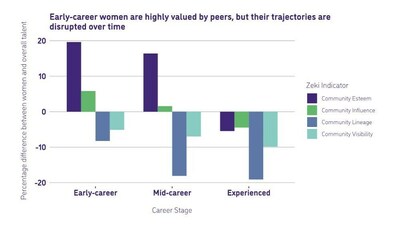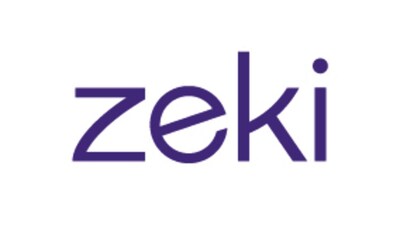Breaking News
Innovation
Unlocking Potential: The Women in AI 2024 Report by Zeki Research Highlights Gender Gap Solutions
Leo Gonzalez
March 20, 2024 - 14:28 pm

Bridging the Gender Divide: Zeki Research Unveils Groundbreaking "Women in AI 2024" Report
A Pioneering Study of Female AI Talent
LONDON, March 20, 2024 /PRNewswire/ -- In a landmark initiative to map out the landscape of female expertise in the field of Artificial Intelligence, Zeki Research, a premier UK-based talent intelligence firm, released its inaugural "Women in AI 2024" report today. Zeki Research is renowned for its unique dataset, which includes over 133,000 professionals and upwards of 2 million distinct data points. The comprehensive report, available for public access, showcases an extensive ranking of more than 33,000 women hailing from 109 different countries, with diverse backgrounds in education across 4,300 universities and career paths in over 42,000 companies and organizations worldwide.
Profound Insights into Female AI Talent Dynamics
Zeki Research's unparalleled study presents valuable, data-driven findings focusing on effective strategies to discover, attract, and retain preeminent women in the AI sector. Key revelations within the free report include:
Quick Exit from Big Firms
The study reveals that women are highly represented in large corporations but tend to depart swiftly. Statistics indicate that over 60% of female recruits exit the Big Five tech giants—Amazon, Apple, Google, Meta, and Microsoft—within their initial two years of employment.
The Advancement Gap Challenge
As women advance through their careers, they experience a notable 30% deficit in visibility and acknowledgment relative to their colleagues. This trend points at a significant underutilization of potential within the AI sphere.
Champions of Female Hiring
Certain forward-thinking companies have been recognized for hiring women at rates higher than the industry standard, which stands at 22%. Noteworthy examples include Intuit at 41%, ETS AI Labs at 38%, and Bayer at 34%.
University Attraction Versus Industry Representation
While U.S. universities are increasingly responsible for training top female AI talent, women still represent a mere 22% of personnel in significant U.S. university AI labs, underscoring a glaring gender disparity in academia.
Small Company Preference
Outstanding women in AI are shown to prefer continuity and choose workplaces with more female colleagues, oftentimes opting for smaller companies that provide opportunities to work on meaningful issues.
Sectoral Shifts in Talent Attraction
Exemplifying triple-digit growth over the past decade, the health and consulting domains—inclusive of firms such as MD Anderson Cancer Center, Roche, Booz Allen Hamilton, and Boston Consulting Group—are leading the charge in attracting exceptional female talent.
The Lost Opportunity: Achievement Gap in Recognition

Figure: Zeki Research Women in AI 2024 Report: Achievement Gap. Women in AI receive 30% less visibility and recognition as their careers progress compared to peers, representing a critical loss of potential within the AI field.
Zeki Research Identity

Figure: The official Zeki Research Logo.
Expanded Insights on the AI Talent Race
The extensive "Women in AI 2024" report can be readily downloaded at no cost from Zeki’s website. For further detailed analysis, consider perusing Zeki's flagship publication, the "State of AI Talent 2024". This principal report offers practical intelligence on the nations, companies, universities, and industries gaining or losing ground in the quest for superior AI talent. Such intelligence equips organizations with an advantageous position in pinpointing investment prospects, fostering innovation, and securing premier talent.

The Quest for Gender Parity in AI: An Uphill Battle
Diving deeper into the findings presented by Zeki Research, the "Women in AI 2024" report illuminates the persistent gender gap that troubles the tech industry, particularly within the realm of artificial intelligence. Data showcased in the report emphasizes the need to focus not only on attracting more women into this cutting-edge field but also on retaining them and ensuring their achievements are recognized and rewarded commensurately.
Women prioritize not only excellence in their research pursuits within the sciences and engineering but also harbor an intense commitment to employing their expertise toward making AI safer and more equitable for society at large. Zeki’s report serves as a clarion call for the industry to acknowledge and address the impediments faced by women in AI – epitomized by the 'advancement gap' where despite equal merit, women receive substantially less recognition as they climb the professional ladder.
The Influencers and the Influenced: Parsing the Data
Per Zeki's findings, the organizations that employ women at greater-than-average rates stand as testaments to the positive impact an inclusive hiring policy can have on a corporate ecosystem. Conversely, the quick turnover of female staff at large institutions brings to light a discomforting trend. The report's statistical muscle suggests that a lack of meaningful career progression, inclusivity or support for women's leadership aspirations could be driving the high attrition rates at these industry stalwarts.
When examining the fascinating dynamics between academia and industry, it's evident that despite a strong educational backbone provided by prominent universities, the translation of this talent into industry leadership roles is lagging. This suggests a systemic issue within the hiring and promotional frameworks of corporate entities that require immediate attention to leverage the full spectrum of available talent.
The Tipping Point: Small Companies and Industry-Specific Trends
Regarding the preferential shift towards smaller companies, the data might imply a strive for a more intimate work environment where women feel their contributions are not just seen but valued, where the camaraderie is palpable, and where each person's work is integral to the success of the business.
The industry-specific trends captured by the report bring to light the sectors that have made significant strides in this direction. The triple-digit growth in the health and consultancy sectors over the past ten years illustrates a remarkable effort to create environments that not only draw in top female talent but also inspire them to commit and contribute their skills fully.
Towards A More Equal Future: Zeki's Role in Shaping AI
By distilling this vast array of data through meticulous analysis, Zeki Research attempts to bridge the gender divide and spur actionable changes within the technology and AI industries. It is paramount that companies and academic institutions alike take note of these insights in order to catalyze a shift towards a more diverse and inclusive workspace.
Women's engagement with AI is also painted as inherently aligned with a broader societal good, which breaks away from the traditionally profit-centric focus of tech careers and indicates a profound sense of purpose among women professionals in this field. Empowering women to thrive in AI is likely to have enduring social benefits beyond the immediate advancements in technology and could be pivotal in steering AI development towards ethical and humanitarian ends.
Zeki Research, through its pioneering efforts, casts a spotlight not only on the unresolved challenges but also shines a beacon for hopeful progress. By highlighting companies that serve as exemplars of inclusive and supportive environments and underscoring the critical points of loss within the talent pipeline, the "Women in AI 2024" report plays a pivotal role in charting the way forward.
Conclusion: A Call to Action
This comprehensive report stands as both an exposé on the current state of gender representation within AI and a directory for positive change. For those in the vanguard of AI research, development, and application, engaging with the contents of this and similar reports is not just recommended but vital for fostering an equitable and prolific future for the field of AI.
There is no denying the complexity of the challenges that the report unveils, but it also makes evident that there are verifiable solutions and success stories that can be replicated and broadened. The vibrant and varied experiences of women in AI as portrayed in Zeki Research's report, replete with both the barriers they face and their triumphs, is the data-backed narrative that could very well shape the next phase of innovation and equity within the technology space.
Armed with the insights from "Women in AI 2024," industry leaders and policymakers are now in a position to take concrete steps to ensure that the AI landscape is not only reflective of the demographic diversity but also is a catalyst for harnessing the untapped potential of women in AI. As we delve into the report's comprehensive analysis, the road maps to actualizing a more gender-balanced future in artificial intelligence are there for us to follow.
In sum, Zeki Research's "Women in AI 2024" report is a critical tool for understanding and tackling the gender gap issue in AI. Offering an unprecedented look at the current state of women in the field, it is a sterling example of how data can be harnessed for societal progress and corporate excellence. As stakeholders and enthusiasts ponder its findings, its true impact will unfold in the changes it propels across the global AI ecosystem.
instruments trends© 2024 All Rights Reserved




















